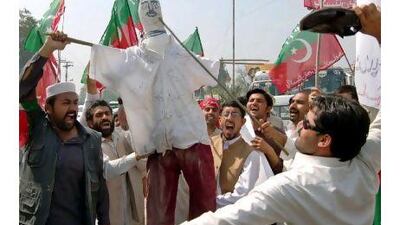ISLAMABAD // The surprise pardon yesterday of a CIA security contractor accused of double murder has inflamed anti-US sentiment in Pakistan, prompting the US Embassy in Islamabad to shut its doors and consulates tomorrow amid fears of violence.
Demonstrations broke out across the country yesterday when news that Raymond Davis, 36, was released after paying a reported US$2 million (Dh7.3 million) in blood money to the families of the two men he was charged with shooting dead in Lahore in January. At least 800 students demonstrated in Lahore, chanting "Death to America", while in Peshawar, police used tear gas and batons to beat back protesters, a police official told Agence France-Presse. Hundreds-strong protests were also held in the central city of Multan and in several areas of Islamabad.
The release of Mr Davis, who claims he shot the men in self-defence, came at a time when ties between Islamabad and Washington are increasingly fragile. Analysts are still debating how the case will affect relations between the two allies, which are engaged in a fight against extremism and terrorism near the Afghan border.
US diplomats had said Mr Davis enjoyed full diplomatic immunity from prosecution and pressed for his release.In turn, the Pakistanis expressed anger and frustration at the killings and subsequent court proceedings. Mr Davis, who was perceived as a US spy after leaks by Pakistani intelligence agencies were fed to local media outlets, was often burnt in effigy and some demonstrations called for him to be hanged. More demonstrations are being planned for today.
Opposition politicians and Islamic political parties had been leading the call for a death sentence.
The news of Mr Davis's release yesterday left them in a state of shock. Hamid Gul, a former head of the country's powerful intelligence service, the Inter-Services Intelligence directorate, and now a critic of the service, called the release a "sell-out".
Imran Khan, the famous cricket player-turned-politician, joined the call for protests and said Mr Davis's freedom would increase extremism in Pakistan. Dozens of his party members clashed briefly with police in Lahore on Wednesday.
Many Pakistanis were angered by the way Mr Davis was fast-tracked through the justice system as well as other alleged irregularities. Some members of the victims' families alleged that they had been coerced into an agreement. Also, the families' original lawyer was abruptly sidelined for Wednesday's hearing. Instead, Raja Irshad Kiyani, a lawyer used by the ISI, represented the families of the deceased men during Mr Davis's six-hour trial.
Despite the initial outrage, some political analysts and commentators believed that protests would perhaps be sporadic and inconsequential with public anger soon blowing over. Ayesha Siddiqua, a political analyst and columnist in Islamabad, said that since the ISI allegedly orchestrated the deal to release Mr Davis, it would also ensure that frustration does not spill out into the streets.
"People are upset. People are agitated. The hatred against United States cannot go away as it is more [systemic] in nature," Ms Siddiqua said. "But the military establishment, through media, would deflect the anger at politicians. The overall impact may be that people will get angrier towards the politicians."
Ms Siddiqua said the US created a public relations disaster by the way it initially handled the case. For example, she said, US officials initially described Mr Davis as working for the US consulate in Lahore and not US Embassy in Islamabad, which complicated claims about immunity. There was also resentment that US officials showed little or no sympathy for the victims.
"What is most important is what agreement has been reached between the CIA and the ISI", Ms Siddiqua said. "[The] CIA was caught with its pants down. There are times when operators can be very foolhardy."
There is speculation the ISI used the arrest of Mr Davis as a bargaining chip, leaning on its US counterparts to dismantle a parallel intelligence network within the country. Mr Davis was seen as part of increasing covert activity inside Pakistan by the US, which had shown displeasure at the way Pakistan has been dealing with militants.
Dawn, the country's leading English-language newspaper, reported this week that behind-the-scenes negotiations between the CIA and the ISI were "making progress" and that the ISI had "sought a redefinition of its terms of engagement with the CIA".
The fact that Sharia law, which is legally binding in Pakistan, was used to broker a blood-money settlement has caught the right-wing opposition parties off guard.
"Now that both countries have employed an Islamic condoned principle [diyat], right-wing elements are getting a taste of their own medicine according to liberal groups," said Reem Khan, a columnist for The Daily Times in Lahore. "It's an issue that really has no sides; national interest and the larger picture were always bound to dominate."
Hasan Askari Rizvi, a defence and political analyst in Lahore, said the verdict was a dilemma for Islamist parties eager to capitalise on entrenched hatred of the US.
"For the government, one major headache has been removed. For the Islamists, this is a major setback," Mr Rizvi said. "They had been trying to mobilise people but this issue has suddenly slipped out of their hands. I do not think they can now launch a sustained public movement."

